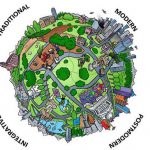What is a Worldview?
In order for a person to be able to function in their environment, they need some form of a guiding philosophy that allows them to make sense of their world and to interact with it. All intelligent beings naturally have questions about the world and seek answers to these questions in order to live an adequate life. The set of high-level answers that a person has to the philosophical questions that are essential to life constitutes the person’s worldview.
A worldview is a consistent and integral sense of existence and provides a framework for generating, sustaining, and applying knowledge. According to Annick de Witt, who recently launched Worldview Journeys:
Worldviews are inescapable, overarching systems of meaning and meaning-making that to a substantial extent inform how we interpret, enact, and co-create reality. A worldview is thus a complex constellation of epistemic capacities, ontological presuppositions, and ethical and aesthetic values that converge to dynamically organize a synthetic apprehension of the exterior world and one’s interior experiences.1
An individual uses their worldview as a tool for interpreting the complexities of the world while serving as a guide to their interaction with external reality. Examples of worldviews include religions such as Christianity, Judaism, Islam, Buddhism, Hinduism, etc. and secular belief systems such as atheism, materialism, and some forms of agnosticism.
It would probably be helpful to clarify what is meant by “religion” and “secular” here. There are a few ways to define “religion”. Traditionally, this is understood to be an organized approach to worship, faith, and spirituality and is supposed to lead followers to the ultimate truth. The definition that is most relevant here is a belief system that postulates the existence of the supernatural to explain the cause, nature, and purpose of the universe, often involving a certain moral code of conduct. Religion is usually, though perhaps not always, facilitated through faith. Some definitions of religion involve ritual observances such as organized worship as an essential aspect, but it seems that these better fall into the category of cultural practice. Religion often goes hand in hand with culture, but one’s religion does not necessarily determine one’s cultural practices and vice versa. “Secular” quite simply refers to things that do not pertain to religion and are instead more worldly focused. The distinction between religious and secular worldviews becomes important when one is assessing and comparing them based on factors such as reasonableness, comprehensiveness, and enlightenment.
Twentieth Century philosopher Leo Apostel conducted a significant amount of research on the nature of worldviews and how they are constructed and produced detailed and comprehensive work on this subject. He defined worldview as consisting of several different elements including ontology, epistemology, ethics, and others. The exact list of elements is not universally agreed upon and Apostel himself refined his own list over the course of his career. What is common to any list is that they are all essentially categories of questions that one can have about the world and the corresponding beliefs that one holds as answers to these questions. For example, if one asks “What is the meaning of life?” then this falls under the category of either Teleology and the answer that one has for this constitutes part of this person’s worldview.
Apostel, in collaboration with Jan van der Veken and others, put forth a list of elements that constitute a worldview in the short book “Worldviews – From Fragmentation to Integration”.2 More recently, Clément Vidal analyzed Apostel’s list and reworked it into a list of questions with corresponding branches of philosophy, which appears in the paper “What is a Worldview”.3 While Vidal’s list is easier to follow, he leaves out some details from Apostel’s original list. The following list unifies both of these lists by taking the best of each:
| Question | Description | Related Branch of Philosophy |
| What exists? | Model of reality as a whole | Ontology |
| Where does it all come from? | Model of the past | Explanation |
| Where are we going? | Model of the future | Prediction |
| How do words and symbols have meaning? | Theory of language and logic | Philosophy of Language, Philosophy of Logic |
| What is good and what is evil? | Theory of values, often understood to include ethics | Axiology |
| How can we act? | Theory of actions, related to ethics | Praxeology |
| What is true and what is false? | Theory of knowledge | Epistemology |
| What is the nature of personal experience? | First person study of consciousness and personal identity | Phenomenology, Philosophy of Mind |
| What is the meaning or purpose of global reality and do we have any special role in it? | Theory of ends and purposes | Teleology |
It is possible that other elements could be added to this list, but it is likely that almost any philosophical question that one could ponder can be categorized into one or more of these nine elements. For example, the question “What happens after we die?” falls under the category of Prediction. The question “Do people have souls?” falls under the category of Ontology. The question “Why is the universe the way that it is and not different?” falls under the category of Explanation. Questions relating to ethics, such as “What should I do?”, “How should I live my life?”, and “What would be the best thing to do in a situation such as what I am faced with now?” do not correspond directly to one single element of worldview because ethics has implications for both values and actions, in other words both Axiology and Praxeology. Likewise, many other questions one can ask have implications for two or more worldview elements. While there are multiple lists of high-level questions of life that have been compiled, including Apostel’s list and Vidal’s list and others as well, the list given here is the one that will be used throughout this project.
One should note the difference between worldview and ideology. Worldviews constitute one’s core belief system and are mostly philosophical, whereas ideologies constitute one’s secondary belief system and are mostly sociological, political, and/or economic. One’s worldview precedes one’s ideology. Moreover, one’s worldview may or may not work to determine what ideologies one can accept and still maintain coherent beliefs overall.
For example, if one has Christianity as their worldview then it is unlikely that they will be able to subscribe to Marxist ideology, at least in the traditional sense, and still have coherent beliefs because Marxism is traditionally atheistic, and Christianity is theistic. On the other hand, such a Christian should be open to ideologies ranging from anarchism to libertarianism to social democracy and should be able to incorporate any of these belief systems with their religion without too much difficulty.
What is your worldview? How did you come to believe this? Please let your voice be heard in the forum.
1Hedlund-de Witt, Annick. Worldviews and their significance for the global sustainable development debate. Environmental Ethics, 2013.
2 Aerts, Diederick, Apostel, Leo, De Moor, Bart, Hellemans, Staf, Maex, Edel, Van Belle, Hubert, Van der Veken. “World views – From Fragmentation to Integration.” VUB Press, 1994.
3 Vidal, C. “What is a Worldview?” in press. Acco, Leuven, 2008.







